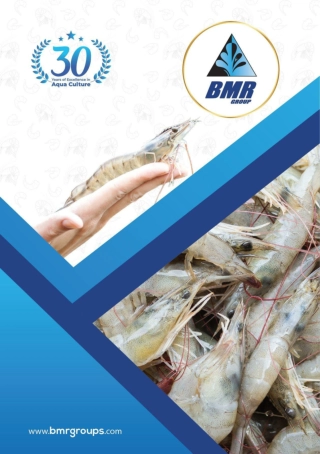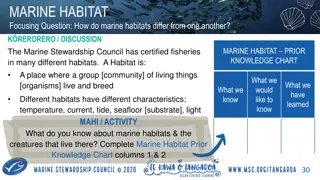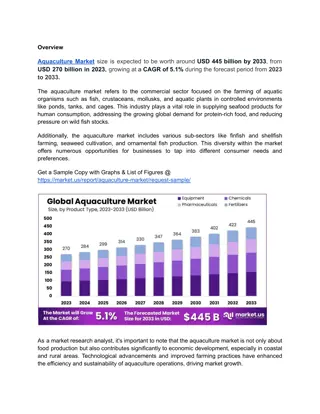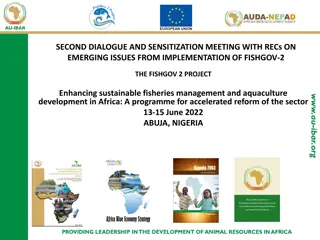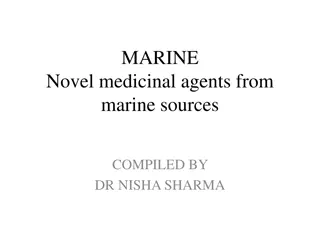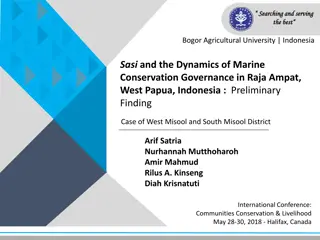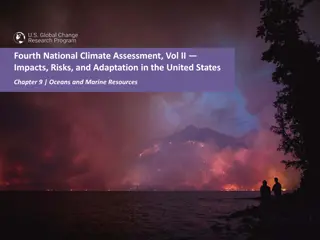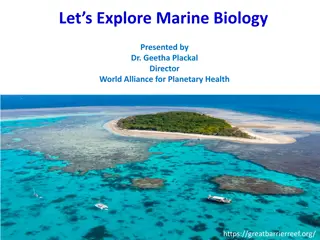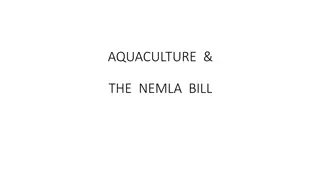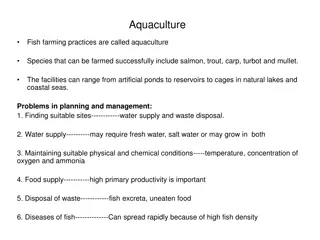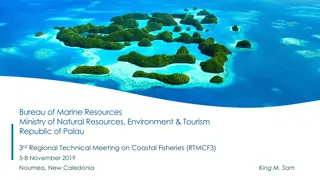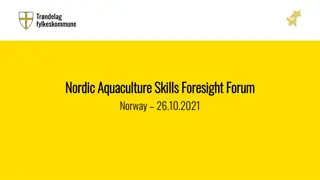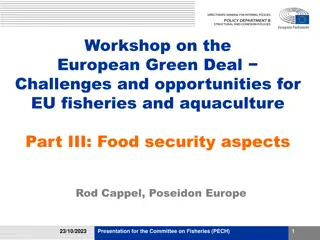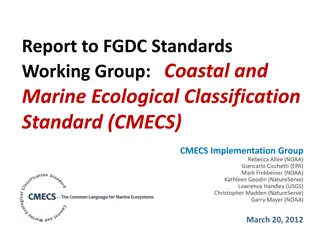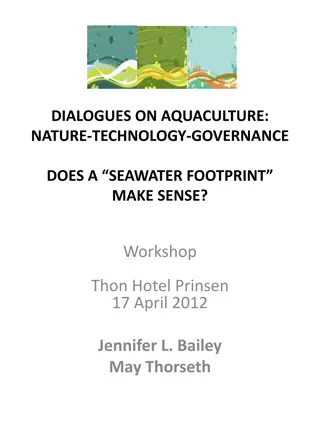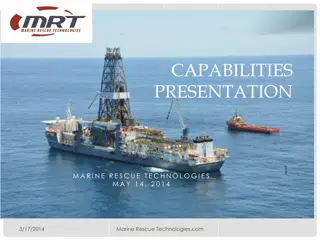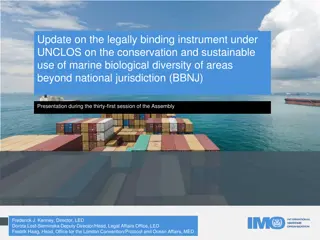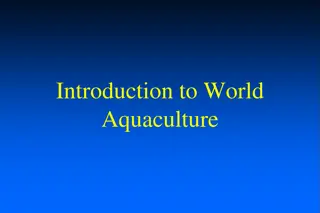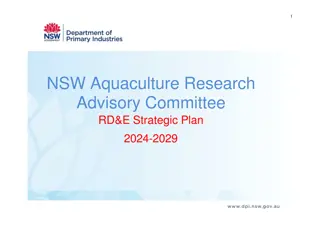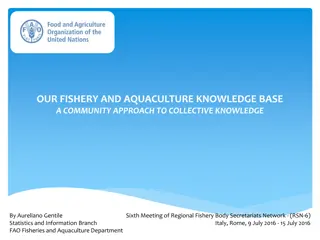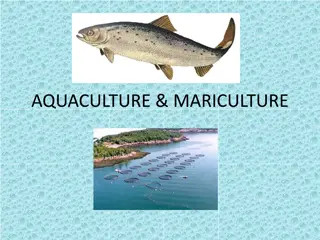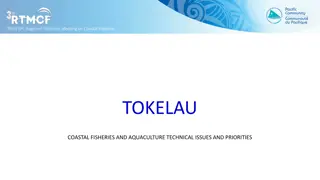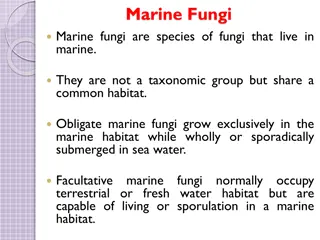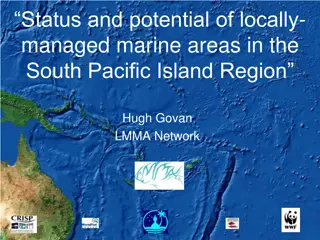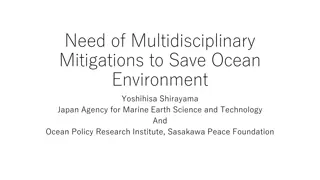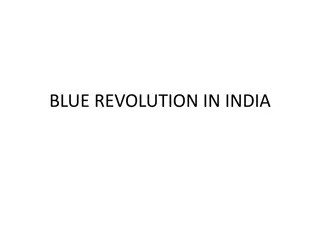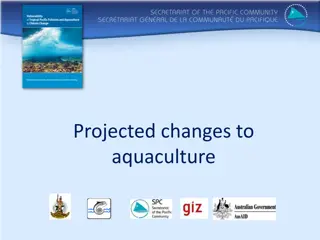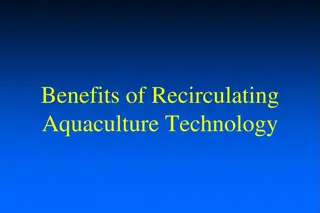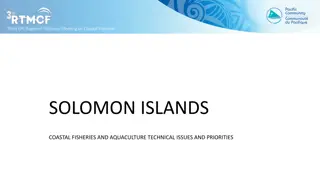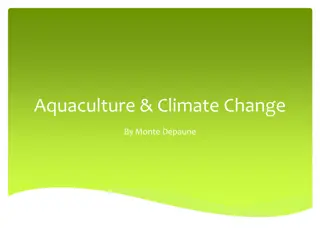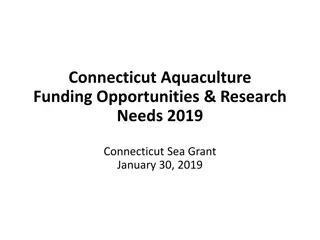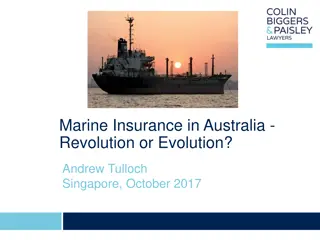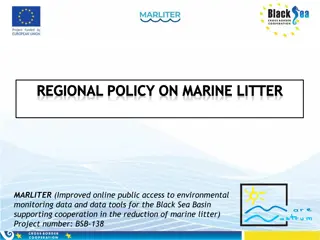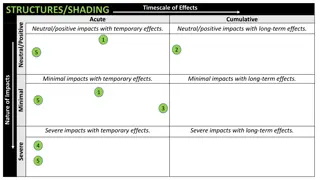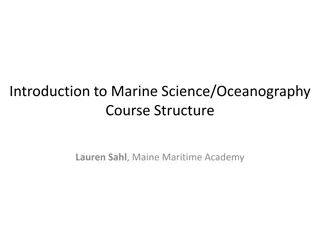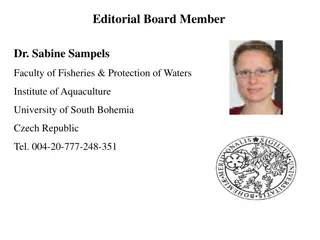Sphinx Marine - Offshore Marine Company in UAE
Sphinx Marine is an offshore marine company based in Ajman, UAE, established in 2006. They specialize in providing maritime navigation, communication, safety equipment, and services in the Gulf Area and Middle East. With a focus on customer-centricity, safety, and quality, Sphinx Marine is ISO 9001:
0 views • 20 slides
BMR Group of Industries - Leading the Way in Shrimp Farming Innovation
BMR Group of Industries is a vertically integrated company providing comprehensive solutions to shrimp farmers. Established in 1991, the group has been instrumental in introducing new shrimp species like Pacific Whiteleg shrimp and improving aquaculture practices in India. Dr. B. Masthan Rao, the vi
0 views • 16 slides
Understanding Marine Habitats and Their Diverse Ecosystems
Marine habitats vary in characteristics such as temperature, current, tide, seafloor substrate, and light, influencing the communities of organisms that live within them. The certification of fisheries by the Marine Stewardship Council ensures minimal impact on local habitats, emphasizing the import
0 views • 6 slides
Sustainable Aquaculture Products Attract Environmentally Conscious Consumers
Aquaculture Market By Product Types(Equipment, Chemicals, Pharmaceuticals, Fertilizers), By Culture(Fresh Water, Brackish Water, Marine Water), By Species( Aquatic Plants, Aquatic Animals), By End-User(Seafood Industry, Pharmaceuticals, Others), By R
0 views • 4 slides
Enhancing Sustainable Fisheries Management and Aquaculture Development in Africa: FishGov-2 Project
The FishGov-2 project aims to enhance sustainable fisheries management and aquaculture development in Africa, aligning with AU Agenda 2063. It focuses on evidence-based policies, coordination at different levels, and effective participation in international forums. The project seeks to improve food
1 views • 26 slides
Marine Novel Medicinal Agents from Marine Sources Compiled by Dr. Nisha Sharma
Oceans, covering more than 70% of the Earth's surface, harbor a plethora of invertebrates and algal species, providing a rich source of medicinal compounds. Marine organisms have yielded commonly used drugs like shark and cod-liver oils, sodium alginate, agar-agar, and chitin. Various classification
1 views • 9 slides
Marine Conservation Governance in Raja Ampat, West Papua, Indonesia
Explore the dynamics of marine conservation governance in Raja Ampat, West Papua, Indonesia, with a focus on Sasi practices and the preliminary findings in the West Misool and South Misool districts. Discover the potential resources in Raja Ampat and the various types of marine conservation areas in
0 views • 22 slides
Impacts of Climate Change on Oceans and Marine Resources in the United States
The Fourth National Climate Assessment highlights the disruption of ocean ecosystems due to increasing global temperatures, leading to loss of habitats, changes in species composition, and food web structure. Marine fisheries face high risks from climate-driven changes, impacting distribution, timin
1 views • 10 slides
Marine Biology: Importance, Scope, and Responsibilities
Exploring the realm of marine biology reveals its crucial role in understanding and preserving marine ecosystems under threat. This field offers diverse career opportunities, from research to conservation efforts. Marine biologists play a pivotal role in studying, monitoring, and protecting marine l
0 views • 14 slides
Understanding Aquaculture and Its Regulatory Impacts on Industry Growth
Aquaculture involves farming fish, molluscs, and plants in controlled environments, offering a sustainable way to grow economies and provide protein. However, regulatory efforts like NEMBA are affecting industry growth by imposing restrictions on both alien and indigenous species. These regulations
2 views • 16 slides
Challenges and Future Trends in Aquaculture Farming Practices
Aquaculture, or fish farming, involves farming species like salmon, trout, and carp in various facilities ranging from artificial ponds to coastal cages. Challenges in planning and management include finding suitable sites, maintaining water supply, ensuring proper physical and chemical conditions,
1 views • 4 slides
Coastal Fisheries and Aquaculture Development in Palau: Priorities and Progress
The Bureau of Marine Resources in Palau has identified key technical priorities for coastal fisheries and aquaculture development. These priorities include updating strategic plans, strengthening institutional frameworks, establishing data management programs, and enhancing aquaculture capabilities.
0 views • 6 slides
Nautilus Marine Insurance Australian Sailing Program Overview
Nautilus Marine Insurance offers a comprehensive suite of insurance products tailored for Australian Sailing clubs, providing top-notch claims services, expert staff, and innovative solutions. With a strong focus on underwriting and customer service, Nautilus Marine is a trusted partner for marine i
0 views • 10 slides
Future Trends in Aquaculture Education and Training in Nordic Countries
The content discusses the current and future needs for aquaculture education in Nordic countries, focusing on short-term and long-term perspectives. Key points include the importance of practical education, specialized courses in technology and fish health, and collaboration between authorities and
0 views • 14 slides
Workshop on European Green Deal Challenges & Opportunities for EU Fisheries and Aquaculture
The presentation by Rod Cappel from Poseidon Europe discusses the food security aspects of the European Green Deal (EGD) for EU fisheries and aquaculture. It covers study objectives, EGD policy instruments overview, case studies on EU seafood imports and aquaculture, and provides policy recommendati
0 views • 11 slides
Coastal and Marine Ecological Classification Standard (CMECS) Implementation Progress
The report highlights the development, timeline, objectives, and importance of the Coastal and Marine Ecological Classification Standard (CMECS) along with its implementation progress. It discusses the need for a national standard for classifying coastal and marine habitats, the objectives of CMECS,
1 views • 38 slides
Cross-disciplinary Dialogue on Aquaculture Sustainability
Explore the concept of Sea Water Footprint (SWFP) and its relevance to aquaculture sustainability through a workshop at Thon Hotel Prinsen. Delve into the integration of social science, humanities, natural science, and technology to address key issues in Marine Coastal Development. Discuss the poten
0 views • 5 slides
Marine Rescue Technologies: Innovating Ocean Safety Solutions
Marine Rescue Technologies (MRT) is a leading provider of maritime survivor locating devices, retrieval systems, and rescue products. Founded in 1993, MRT serves a wide range of clients in the oil & gas industry, commercial marine sector, and maritime agencies worldwide. Their products cater to the
3 views • 15 slides
Update on Legally Binding Instrument under UNCLOS for Marine Biological Diversity Conservation
United Nations General Assembly is developing a treaty under UNCLOS for conservation of marine biological diversity in areas beyond national jurisdiction since 2015. The objective is sustainable use of marine genetic resources, area-based management tools, environmental impact assessments, capacity-
0 views • 18 slides
Tracking Marine Fauna: Examples from ProDelphinus Peru Leatherback Tracking Project
ProDelphinus is dedicated to conserving endangered marine fauna like sea turtles, marine otters, cetaceans, seabirds, and sharks. They use the Darwin Core Archive format and collaborate with Marine TLO for ontology mapping. The project involves tracking leatherback sea turtles and making occurrence
1 views • 8 slides
Understanding the Dynamics of World Aquaculture and Seafood Trade
Aquaculture plays a vital role in providing essential nutrition to over one billion people globally, with more than 50% of food fish supply originating from this system. Seafood holds significant importance in international trade, surpassing all other animal proteins combined. However, challenges su
0 views • 8 slides
NSW Aquaculture Research Advisory Committee RD&E Strategic Plan 2024-2029
The NSW Aquaculture Research Advisory Committee (ARAC) was established to advise the Minister on contributions for aquaculture research and development. The strategic plan outlines priorities, framework, and performance indicators for RD&E investments in the NSW aquaculture industry. It emphasizes c
0 views • 14 slides
Enhancing Fisheries and Aquaculture Knowledge for Sustainable Development
The Fishery and Aquaculture Knowledge Base, presented at the Sixth Meeting of Regional Fishery Body Secretariats Network, focuses on collective knowledge exchange in the fisheries and aquaculture sector. This knowledge hub offers a wealth of information on various aspects, supporting Sustainable Dev
0 views • 13 slides
Understanding Aquaculture and Mariculture Practices
Aquaculture encompasses the breeding, rearing, and harvesting of aquatic organisms in various water environments, while mariculture focuses on marine plants and animals in marine or brackish water. This includes controlled breeding for commercial, recreational, and conservation purposes. Technologic
0 views • 30 slides
Coastal Fisheries and Aquaculture Priorities in Tokelau
This document discusses the technical issues and priorities for coastal fisheries and aquaculture in Tokelau, a group of low-lying coral atolls heavily dependent on coastal resources. It highlights the need for assessing fisheries resources, supporting sustainability, and exploring aquaculture poten
0 views • 6 slides
Overview of Marine Fungi and Their Habitats
Marine fungi are diverse species that inhabit marine environments, with some being obligate marine fungi while others can adapt to various habitats. They play essential roles in marine ecosystems by decomposing organic matter and interacting with other organisms. Factors affecting their distribution
2 views • 13 slides
Dive into the Marine Creatures Memory Game and Fun Facts
Embark on an oceanic adventure with a marine creatures memory game featuring two challenging levels. Test your memory skills by matching pairs of marine animals while uncovering fascinating facts about these underwater wonders. Discover unique traits of various creatures like clownfish, dolphins, an
1 views • 5 slides
Evolution of Locally Managed Marine Areas in the South Pacific Island Region
This content discusses the status, potential, and objectives of Locally Managed Marine Areas (LMMAs) in the South Pacific Island Region, highlighting the evolution from traditional purposes to modern conservation and fisheries management practices. It also provides insights into the inventory of Mar
0 views • 27 slides
Multidisciplinary Mitigations for Ocean Environment Conservation
Global ocean climate change poses significant threats to marine ecosystems, requiring multidisciplinary approaches for mitigation. Japanese research highlights expanding distributions of reef-building corals, deep-sea water temperature rise, ocean acidification impact on marine plankton, and thinnin
0 views • 4 slides
The Blue Revolution: Transforming India's Fisheries Sector
The Blue Revolution in India refers to the significant increase in fish and marine product production through innovative techniques and government-sponsored programs. Launched during the 7th Five-Year Plan, it has revolutionized aquaculture practices, leading to improved breeding, rearing, marketing
0 views • 15 slides
Aquaculture Adapting to Climate Change: Insights and Strategies
Aquaculture faces evolving challenges due to climate change. Freshwater and coastal aquaculture, focusing on tilapia, milkfish, freshwater prawn, and marine species, are explored. The vulnerability of aquaculture is highlighted, along with potential benefits and risks posed by climate change. Strate
0 views • 25 slides
Advantages of Recirculating Aquaculture Systems for Sustainable Fish Production
Recirculating aquaculture technology offers numerous benefits such as water reuse, minimized water consumption, enhanced biosecurity, and cost-effectiveness. By adopting recirculating systems, aquaculture farms can comply with stricter regulations, address water scarcity issues, and optimize product
0 views • 13 slides
Coastal Fisheries and Aquaculture Priorities in Solomon Islands
The Third SPC Regional Technical Meeting highlighted key technical priorities for coastal fisheries and aquaculture in the Solomon Islands, focusing on community-based resource management, science-based stock assessment, aquaculture biosecurity, and conducive environment for development. Recent acti
0 views • 6 slides
Aquaculture and Climate Change: Strategies for Sustainable Milkfish Farming in Nauru
Nauru is looking to revitalize its aquaculture sector by focusing on milkfish farming to enhance food security and economic sustainability. The government is taking steps to develop aquaculture infrastructure and expand production to meet growing demand. With projected changes due to climate change,
0 views • 15 slides
Connecticut Aquaculture Funding Opportunities & Research Needs 2019
Explore current funding opportunities for aquaculture projects in Connecticut through programs like the CT Sea Grant Omnibus Funding. Emphasis is on addressing industry needs, conducting applied research, and developing knowledge in areas related to fisheries, aquaculture, and marine resources. Nati
0 views • 17 slides
Evolution of Marine Insurance in Australia: A Review of Historical Context and Reform Provisions
Exploring the evolution of marine insurance in Australia, this review delves into historical frameworks such as the Marine Insurance Acts of 1906 and 1909, as well as modern reforms influenced by the United Kingdom. Key principles adopted by the MLAANZ Committee and current recommendations surroundi
0 views • 33 slides
European Union Regulations and Directives on Marine Litter and Waste Management
Marine litter poses a significant threat to the marine environment, prompting the adoption of various international, regional, and national instruments to address the issue. Key directives such as the Marine Strategy Framework Directive and Waste Framework Directive set out measures to achieve good
1 views • 16 slides
Marine Aquaculture Impacts on Submersed Aquatic Vegetation
The document explores the impacts of structures and shading used in commercial shellfish mariculture activities on submersed aquatic vegetation, particularly seagrasses. It discusses the varying effects of mariculture structures on eelgrass density, productivity, and the potential habitat they provi
0 views • 11 slides
Exploring Marine Science and Oceanography Course Structure
This marine science and oceanography course dives into the traditional structure of understanding oceans, from Earth-building processes to human interactions. It also introduces a unique approach focusing on the oil/plastics cycle, engaging students in active learning and discussions on geoethics. T
0 views • 11 slides
Dr. Sabine Sampels: Research on Aquaculture, Fish Quality, and Human Health
Dr. Sabine Sampels, a member of the Editorial Board at the University of South Bohemia, Czech Republic, specializes in studying the effects of fish consumption on human health, animal nutrition on fish quality, and lipid metabolism. With a background in Food Chemistry and extensive research experien
0 views • 25 slides

